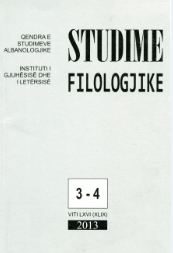ZËRIAUTORIAL NË ROMANET E PETRO MARKOS
AUTHORIAL VOICE IN PETRO MARKO’S NOVELS
Author(s): Margilena MeminajSubject(s): Language and Literature Studies
Published by: Qendra e Studimeve Albanologjike
Keywords: AUTHORIAL VOICE ; PETRO MARKO’S NOVELS
Summary/Abstract: Petro Marko’s is a typical case, which testifies to the relations that exist between his literary work and his life and activity. For this reason, the status of Petro Marko’s oeuvre is represented as rather obscure because in it the boundaries between the lived and the fictitious are more difficult to mark off. In this paper, I look into the rapport between the instance of author as person and text, the identification of the dimensions of “authorial voice” in some of the narrative figures like the narrator, the character, in order to better understand and know their nature and characteristics, which eventually will lead to a possible interpretative approach. It happens that in Petro Marko’s novels, although we are aware of the text’s belonging, we manage to feel in narration, in the character’s descriptions and throughout the text the presence of a voice which we can resolve to calj authorial voice, which represents the point of view, experience, prejudices, convictions and everything else that stems from the author. I will try to identify how this authorial voice comes out in the figures of narrator and character. Iri Petro Marko’s novels, despite the narrative point of view, we happen to get confused with our impressions that Petro Marko narrates in the first person. The truth is that, even if he narrates in the third person, the writer still sees through the eyes of the first person (the character), and both characters introduced through the first person and those introduced through the third person are built upon the author’s memory, experience and consciousness. In general, Petro Marko’s narrative is one of inner vision, subjective of time, historical events in which the writer participated himself. This subjectivity is expressed in the novel through the main character’s subjectivity. Despite the author’s attempt, textual literary devices do not manage to escape authorial voice to the point that they seem the same thing. Bakhtin’s monologic principle to which he opposes the polyphonic principle is one such case. Polyphony has to do with the presence of many dialectical or dialogic voices. This means that none of the voices will outdo, superimpose the others, no viewpoint will definitely impose the others. The author’s position changes here, he does not define characters, but listens and talks to them. He does not transform the other consciousnesses into objects and does not make conclusive external defmitions about them.
Journal: Studime Filologjike
- Issue Year: 2013
- Issue No: 03-04
- Page Range: 089-096
- Page Count: 8
- Language: Albanian

